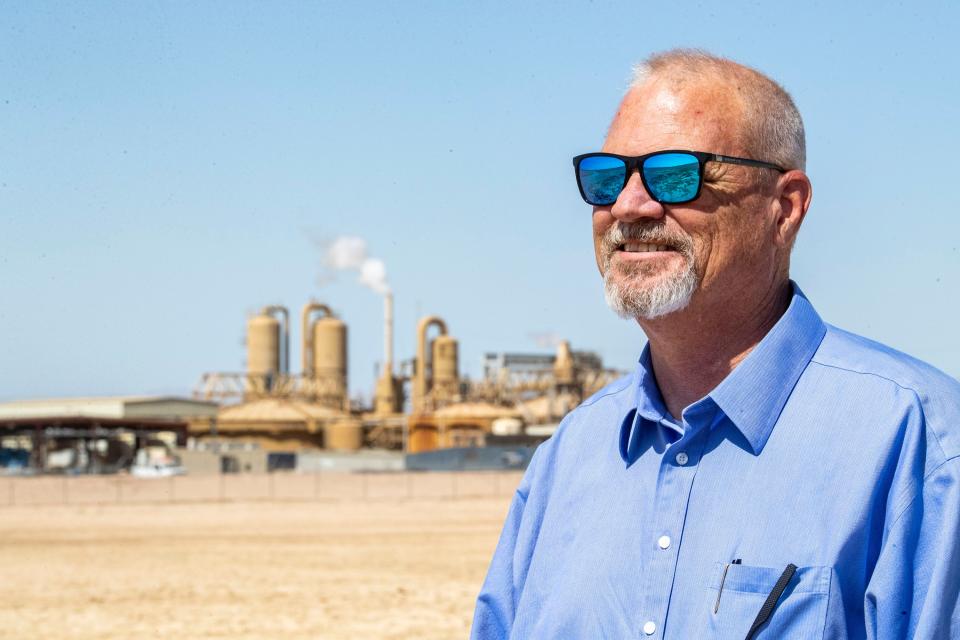White House energy advisor John Podesta, major auto company executives and others are expected to attend a long-awaited ground-breaking on Friday morning for an innovative, billion-dollar lithium extraction and geothermal power plant at the dusty southern edge of the Salton Sea.
The Hell’s Kitchen 1 plant, the first of as many as seven that are planned atop a massive, underground lithium brine reserve by developer Controlled Thermal Resources, received enthusiastically unanimous approvals on Tuesday from the Imperial County Board of Supervisors.
But even after more than a decade of work, the groundbreaking might be premature.
As soon as Tuesday’s votes concluded, an attorney for the nonprofit Comite Civico del Valle handed the clerk of the board written notice of intent to sue to overturn the approvals, because of what the group says were inadequate environmental reviews of potential harm from the project to the area’s destitute residents, who suffer elevated rates of asthma and heart disease.
The group’s concerns include overuse of rapidly disappearing Colorado River water by CTR and nearby projects, potential pollution from construction equipment and diesel trucks to and from the site, unaddressed earthquake risks and inadequate long-term monitoring of hazardous waste, dust and other potential health hazards from a newly developed technology, according to lengthy written comments from and interviews with the group and their attorney Jordan Sisson.
“It’s very clear in our 150 pages of comments. We raised significant concerns about the water usage, hazards and the lack of ongoing data monitoring and ability to implement best practices and future mitigation measures for this novel operation,” Sisson said. The legal notice says the California Environmental Quality Act and local zoning laws were not properly followed, and calls for further reviews or negotiations.
’12 years of crawling across a hot desert’
But Rod Colwell, chief executive officer of CTR, strongly defended the project and its environmental bona fides. He noted they had agreed to pave dirt roads, and with help from Podesta’s office and the U.S. Army Corps of Engineers, won expedited approvals for a 340 wetland on site next to a state-owned wetland that provides critical habitat for rare species. Wetlands also can help contain potentially toxic dust from the rapidly drying edge of the Salton Sea, which has been fed by pesticide- and fertilizer-laden runoff from area farms for more than a century, experts say, as well as a sewage-polluted river from northern Mexico.
“We responded very precisely to the very detailed CEQA document, there’s no cracks in it,” exclaimed Colwell. “We’ve designed the cleanest clean energy project on the planet.”
Noting that the project has taken more than a decade to develop, during which technology has been perfected, acreage and mineral rights acquired, water supply guaranteed and hundreds of millions in initial funding obtained, Colwell said, “It’s been 12 years of crawling across the hot desert through broken glass to get this project done right.”
He acknowledged there could be some construction emissions, but said as a green energy company, they are also seeking to have electrified truck fleets use the site long-term.

Jobs and revenues for an impoverished county
The board of supervisors held the hearing Monday after CCV appealed approvals and permits issued in December by the county planning commission. The supervisors and a large majority of public speakers lauded the project, and endorsed moving it forward immediately.
“We will welcome you with open arms,” board chairman Luis Plancarte said. Fifth District Supervisor John Hawk, also an area farmer, said any overuse of water could be easily addressed with the Imperial Irrigation District’s active conservation programs.
He also dismissed Sisson’s claims of inadequate reviews as “shallow,” “broad” and “vague.” He said the company had surmounted “an enormous hurdle” in its extensive reviews, “not to mention the jobs, the opportunities.”
“I support Imperial County jobs, I support Imperial County’s future, and I believe the applicant has performed their due diligence,” said Fourth District Supervisor Ryan Kelley, who has spent a decade seeking federal and state backing for lithium development in Imperial County.
A fiscal analyst hired by CTR noted the project would generate nearly half a billion dollars over several decades in lithium production fees and property and sales tax revenues. An estimated 250 construction jobs and about 75 full-time jobs, with an average estimated annual salary of $85,000, are also projected to be created. Imperial County’s average income per capita in 2022 was $21,216.
Local, regional and state union representatives crowded the room, and spoke in favor of the project, noting CTR had signed a project labor agreement to use union-represented ironworkers, boilermakers, and other trades.
‘Heartbeat of Mother Earth’
But members of three area tribes testified that the project is on and near sacred grounds for them, home to “mud pots” where hot steam bubbles up from underground that represent “the heartbeat of Mother Earth,” in the words of Carmen Lucas, an elder in the Kwaaymii Laguna Band of Indians. She and the others said the applicant had not conducted adequate, federally required consultation with them.
Colwell said Thursday that they have consulted and continue to consult with an area tribal affairs council, and is committed to providing benefits to the Torres Martinez Desert Cahuilla tribe, which holds lands closest to the site.
The steam that creates the mud pots is also what powers more than a dozen existing geothermal steam plants. It is released from a boiling hot brine pool that sits as deep as 2 miles underground there, and which contains raw lithium and other minerals.
For decades, the lithium was reinjected below ground as waste, but it is now a key ingredient in electric vehicles, renewable energy commercial batteries and smart phones, and has shot up in value. CTR is one of at least five companies either developing or exploring lithium extraction projects here, in an area dubbed Lithium Valley or the Saudi Arabia of lithium. By separating it from relatively clean steam, such projects avoid far more environmentally destructive hard rock mining or massive salt evaporation ponds used elsewhere.
General Motors and Stellantis, which manufactures Jeeps and other brands, have both invested in the project, and were expected to have representatives at Friday’s ground-breaking. CR’s first project will create just shy of 50 megawatts of steam, much of which will be used to produce tons of commercially usable lithium on site.

Luis Olmedo, executive director of Comite Civico del Valle, expressed “cautious optimism” about the Hell’s Kitchen project in a 2021 letter to Podesta, and said in an interview, “we support the clean energy transition wholeheartedly.” In an interview this week, he said he also supports the CR project overall and the union jobs it will create, as long as it does not create environmental and public health risks.
“We support labor 100%, we support their values and we support good jobs … but we can’t just ignore the environmental standards,” he said. “The jobs it will create, that box was checked, and we celebrated it, but that doesn’t mean we’re going to ignore public health and the risk to the ecosystem.”
He said his and other community groups’ concerns were not last-minute, but had been raised for months.
“These are not eleventh-hour submittals, we made every effort to resolve them,” Olmedo said. “We gave the company every opportunity and we reached out and told the county repeatedly about our concerns.”
California Attorney General Rob Bonta held an environmental justice round table at CVC’s offices in Brawley on Monday, and has also taken on CEQA challenges in the past. Olmedo said they explained the Hell’s Kitchen project to him in detail, but was not sure if they would investigate it. Bonta’s spokesman did nor immediately respond to requests for comment.
But Coldwell reiterated that millions of dollars had been spent to design an environmentally sound project, said the company had consulted with Olmedo’s group and many others, and he was baffled by the claims that CEQA had no been complied with. He said the project is moving forward, and a company spokeswoman noted nearly 200 elected officials and supporters will be there on Friday.
“We are commencing construction immediately, hence the groundbreaking,” Colwell said.
Sisson, the attorney for CVC, said, “They can build at their own risk, subject to the outcome of potential litigation, whether that’s a CEQA lawsuit, or perhaps a preliminary injunction. Those are potential options.”
Asked if he intends to seek an injunction to halt work, Sisson said, “No comment at this time.”
Janet Wilson is senior environment reporter for The Desert Sun and co-authors USA Today Climate Point. She can be reached at jwilson@gannett.com
This article originally appeared on Palm Springs Desert Sun: Lithium Valley: Lawsuit could block massive project near Salton Sea
Signup bonus from




